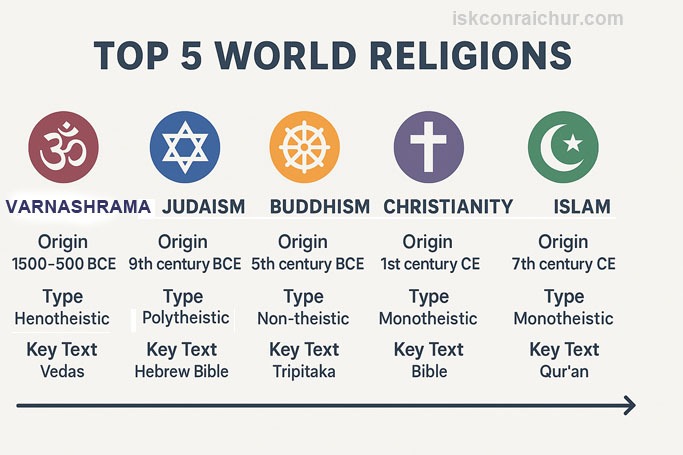
Humanity has sought spiritual truth across millennia. Across continents and cultures, diverse civilizations have developed unique religious paths to understand the divine, the soul, morality, and the ultimate goal of life.
This blog offers a comparative overview of the 10 most practiced world religions, highlighting their origins, core beliefs, scriptures, and paths to liberation.
📊 Summary Table: Comparative Snapshot
| Religion | Founder | Origin (Time & Place) | Supreme Concept | Core Scripture(s) | Liberation Path |
|---|---|---|---|---|---|
| Christianity | Jesus Christ | 1st century CE, Israel | Personal God (Trinity) | Bible (Old & New Testament) | Faith in Jesus & Grace |
| Islam | Prophet Muhammad | 7th century CE, Arabia | Tawḥīd (One God – Allah) | Qur’an, Hadith | Submission to God, 5 Pillars |
| Hinduism | Eternal, Vedic Sages | 2500+ BCE, India | Brahman (personal & impersonal) | Vedas, Upaniṣads, Gita, Purāṇas | Dharma, Bhakti, Karma, Yoga |
| Buddhism | Siddhārtha Gautama (Buddha) | 6th century BCE, India | Non-theistic (Nirvāṇa) | Tripiṭaka, Mahāyāna Sūtras | Eightfold Path, Meditation |
| Sikhism | Guru Nanak Dev | 15th century CE, Punjab | Ik Onkar (One God) | Guru Granth Sāhib | Devotion, Service, Ethical Living |
| Judaism | Patriarchs (Abraham, Moses) | ~2000 BCE+, Middle East | One God (YHWH) | Torah, Tanakh, Talmud | Obedience to Law, Righteousness |
| Daoism | Laozi (semi-legendary) | ~6th century BCE, China | Dao (The Way) | Dao De Jing, Zhuangzi | Harmony with Dao, Wu Wei |
| Confucianism | Confucius | 5th–6th century BCE, China | Ethical-humanistic | Analects, Five Classics | Self-cultivation, Social Ethics |
| Shinto | Indigenous (no founder) | Ancient Japan | Kami (Spirits/Forces) | Kojiki, Nihon Shoki | Ritual purity, Festivals |
| Jainism | Ṛṣabha, Mahāvīra | 9th–6th century BCE, India | Non-theistic, Jīva | Āgamas, Tattvārtha Sūtra | Ahimsa, Renunciation, Karma-free State |
🌟 1. Christianity
- Followers: ~2.4 billion
- Supreme: One Personal God (Trinity: Father, Son, Holy Spirit)
- Key Beliefs: Sin, redemption, grace, resurrection, eternal life
- Scripture: Holy Bible
- Path: Faith in Jesus as the Son of God; salvation through His sacrifice
- Sects: Catholicism, Protestantism, Eastern Orthodoxy
🌙 2. Islam
- Followers: ~2 billion
- Supreme: One transcendent God – Allah
- Key Beliefs: Prophethood, Qur’an, angels, Day of Judgment, Five Pillars
- Scriptures: Qur’an, Hadith
- Path: Submission through Shahada, prayer, fasting, charity, pilgrimage
- Sects: Sunni, Shia, Sufi
🕉 3. Hinduism
- Followers: ~1.2 billion
- Supreme: Brahman – both impersonal and personal (e.g., Viṣṇu, Śiva, Devī)
- Key Beliefs: Dharma, karma, mokṣa, rebirth, multiple spiritual paths
- Scriptures: Vedas, Upaniṣads, Bhagavad Gītā, Purāṇas, Dharmaśāstra
- Path: Bhakti Yoga, Karma Yoga, Jñāna Yoga, Rāja Yoga
- Philosophical Schools: Advaita, Viśiṣṭādvaita, Dvaita, Achintya-Bhedābheda
☸ 4. Buddhism
- Followers: ~500 million
- Supreme: Non-theistic – Nirvāṇa is the goal, not a deity
- Key Beliefs: Four Noble Truths, Eightfold Path, impermanence (anicca), non-self (anattā)
- Scriptures: Pāli Canon (Tripiṭaka), Mahāyāna Sūtras
- Path: Meditation, mindfulness, morality
- Branches: Theravāda, Mahāyāna, Vajrayāna
🛕 5. Sikhism
- Followers: ~30 million
- Supreme: Ik Onkar – One formless God
- Key Beliefs: Equality, remembrance of God, honest living, community service
- Scripture: Guru Granth Sāhib
- Path: Bhakti (Naam Simran), Seva (selfless service), truthful conduct
- Founder: Guru Nanak Dev (1469–1539 CE)
✡ 6. Judaism
- Followers: ~15 million
- Supreme: One transcendent God – YHWH
- Key Beliefs: Covenant with God, obedience to Mosaic Law, ethical living
- Scriptures: Torah, Tanakh, Talmud
- Path: Observing commandments (mitzvot), prayer, moral discipline
- Branches: Orthodox, Conservative, Reform
🌀 7. Daoism (Taoism)
- Followers: ~12 million
- Supreme: The Dao – ineffable source of all being
- Key Beliefs: Harmony with nature, balance of yin and yang, inner stillness
- Scriptures: Dao De Jing, Zhuangzi
- Path: Wu Wei (non-action), meditation, longevity practices
- Practices: Tai Chi, Qigong, Feng Shui
🎓 8. Confucianism
- Followers: ~6 million formally; influences over 1.5+ billion culturally
- Supreme: Ethical humanism; Heaven (Tiān) as moral authority
- Key Beliefs: Virtue ethics, family hierarchy, education, social roles
- Scriptures: Analects of Confucius, Five Classics
- Path: Self-discipline, education, moral behavior, societal harmony
⛩ 9. Shinto
- Followers: ~4 million actively; culturally followed by ~80% of Japanese people
- Supreme: Kami – divine spirits of nature, ancestors, phenomena
- Key Beliefs: Purity, family reverence, seasonal festivals
- Scriptures: Kojiki, Nihon Shoki
- Path: Ritual practices, offerings, purification, reverence for nature
🕊 10. Jainism
- Followers: ~4–5 million
- Supreme: No creator deity; reverence for perfected beings (Siddhas)
- Key Beliefs: Ahimsa (nonviolence), truth, self-control, karma theory
- Scriptures: Āgamas, Tattvārtha Sūtra
- Path: Asceticism, non-attachment, karmic purification
- Founders: Ṛṣabha (1st Tīrthaṅkara), Mahāvīra (24th Tīrthaṅkara)
📘 Conclusion
From the Trinitarian faith of Christianity to the non-theistic meditation of Buddhism, and from the ritual harmony of Shinto to the ascetic nonviolence of Jainism, the world’s religions embody the diverse spiritual quests of humankind.
While their doctrines may differ, each tradition contributes to a richer understanding of life’s purpose, morality, and the quest for transcendence. Exploring them enhances interfaith harmony, promotes mutual respect, and honors humanity’s eternal search for truth.


